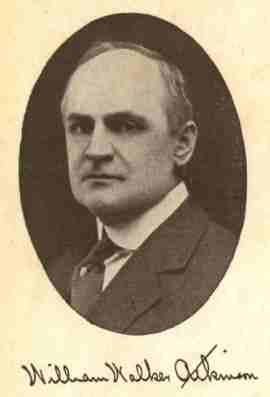SelfDefinition.Org
Thought Vibration: The Law of Attraction in the Thought World
1906
William Walker Atkinson

Preface by the Publisher
Español: ..prefacio.htm
On December, 1901, William Walker Atkinson in assuming the editorship of the popular magazine New Thought, introduced himself to the readers of that periodical in a memorable article. That article contained a clear, ringing, forceful statement of his individual creed, than which nothing can afford a deeper insight into the character and inner self of the man whose name appears as author of this book. It is the crystallized expression of the world-principles, the truths, which his writings seek to illuminate, and in my opinion should be read by every student of his works, as the key to the philosophy he teaches.
For this reason there has been prefixed to this, his latest book, under the title "My Working Creed," the most vital of the fundamental beliefs enunciated by Mr. Atkinson in that famous introductory statement of 1901. [1] None can read the recurring, ringing "I Believe" of this author, without feeling an answering thrill of exaltation and power. To those who read this book I would say, imbue yourself thoroughly with the broad and beautiful spirit of those few preliminary paragraphs that you may pass on understandingly to the perusal of the teachings which follow.
[1. my-working-creed.htm ]
Those who have an opportunity to refer to the article from which this Creed is taken, should do so. [2] It tells of the work, the material success, followed by over-strain, physical and mental breakdown and financial disaster, which marked the earlier years of William Walker Atkinson. It shows how he came to know what he now holds to be the truth, and how, in his own life, he has demonstrated its value. For from mental and physical wreck and financial ruin, he wrought through its principles, perfect health, mental vigor and material prosperity.
[2. Included in New Thought Annual for 1902, published by The New Thought Publishing Co., a.k.a. The New Thought Annual: Year 1902. New York, NY: The Psychic Research Company, 1902. Please advise us if you can locate a copy of this document: /contact/ Possible source: http://iapsop.com/search.html ]
Mr. Atkinson, during the many years of his connection with the magazine, New Thought, built for himself an enduring place in the hearts of its readers. For four years his literary work was confined to its pages (including in addition, three books for its publishers), and article after article of wonderful strength and vital force flowed from his pen. During this time several series of "lessons" appeared, under varying titles, in regard to the application of the Law of Attraction in the Thought World, lessons which created a sensation and exerted a wonderful influence upon the lives of those who applied their principles. They were written in Mr. Atkinson's own sparkling, intimate style, teeming with thought, force, energy, fire, but shorn of all atmosphere of the study, all attempt at "fine writing," polished periods or dignified metaphor, and all affectation or assumption of superior learning. One of Mr. Atkinson's cardinal principles is "Stand on your own feet," and he deprecates any attempt to read infallibility into his writings. For this reason we have again prefaced the present work with a "Foreword" [3] in which he seeks to instill into all students of New Thought, whether as expressed in his writings or in those of others, the quality of self-dependence. A reading of this Foreword will give the student a clear idea of the attitude of mind in which Mr. Atkinson thinks this and all other individual interpretations of life should be approached.
[3. foreword.htm ]
With "My Working Creed" and the "Foreword" as guides, the present reader should enter upon thought vibration, the book proper, in a spirit calculated to extract the greatest possible value.
Thought vibration embraces two series of the vital lessons mentioned above [presumably chapters 1 and 2], with some additional articles by Mr. Atkinson following out the same line of teaching [chapters 3-16]. The order of the lessons has been somewhat changed in the combination; and for further continuity and clearness, new lesson titles in the form of chapter headings have been selected. The publishers have preferred to retain the familiar unstudied style of the lessons, as originally written, rather than to subject the articles to the literary revision by the author which usually precedes publication in book form. They contend that Mr. Atkinson's mightiest influence, his greatest strength and power, lies in his simple, straightforward, and at times even colloquial language—the kind which "even my little son can understand," as wrote in gratitude one earnest student. It is such writing that the world needs,—writing which can be read and apprehended by the "little sons" of the world, whether known as children or as men. There is a great deal of so-called "fine writing" on New Thought subjects, beautiful sentences full of high, though sometimes misty thought; but this world needs common, practical, everyday application of this thought. Where there is one reader for the literary masterpiece, there are a hundred readers (plus even that other one), for the book written as a keen, live, human man talks, and written about the difficulties, the problems, the possibilities of the average citizen of the world.
This is a truth Mr. Atkinson has mastered, and it is with intention he casts from him the restrictions of an academic style. He speaks, always, not in dignified tones to "the public," but in the language of a friend to you. It can be said of him in praise, as of another before him: "The common people heard him gladly! "—the highest, most enduring tribute that can be paid to a leader of men.
Recognition is due to Louise Radford Wells for the revision of the proofs of this book, the selection of its title and chapter headings, and the ordered arrangement of the lessons.
Franklin L. Berry, Editor of New Thought.
June 15, 1906 Chicago, Illinois.